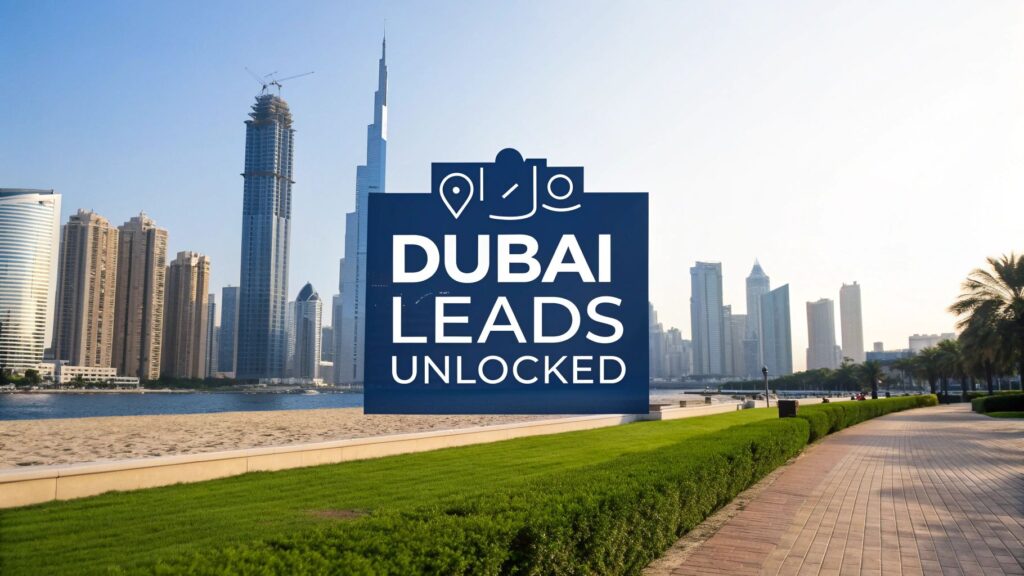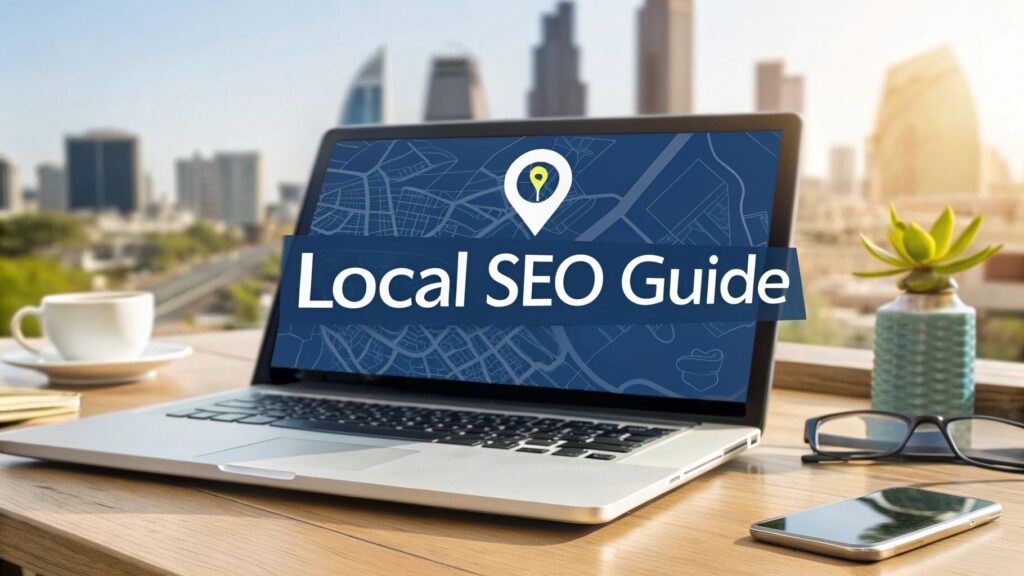Generating quality leads in Dubai is a different ball game. It’s not just about running a slick digital campaign; it’s about understanding a unique business culture that blends cutting-edge technology with old-school relationship building. If you’re trying to apply a generic global playbook here, you’re going to fall flat.
Getting a Feel for Dubai’s Lead Generation Scene

Just look at that skyline. It tells you everything you need to know about doing business in Dubai: it’s ambitious, modern, and fiercely competitive. Your approach to winning clients has to mirror that same forward-thinking, polished energy. First impressions here aren’t just important; they’re everything.
The business environment in Dubai is truly one of a kind. It’s a place where a handshake can seal a deal, but that handshake was probably preceded by weeks of data-driven digital outreach. Simply copying a strategy that worked for you in London or New York won’t cut it. You need a hybrid model—one that respects local customs while making the most of powerful digital tools.
The Mix of Culture and Digital
Dubai’s lead generation market is a fascinating blend of ultra-modern digital life and deeply ingrained business traditions. To make any real impact, you have to balance the two.
We’re talking about a city with over 200 nationalities. A one-size-fits-all message is a surefire way to be ignored. Your campaigns need to be smarter, segmented to resonate with different cultural backgrounds. And while digital is king—thanks to the UAE’s massive social media usage—that popularity means everyone is paying to play.
This diversity touches every part of your strategy, from the images in your ads to the tone of your follow-up calls. What catches the eye of a prospect from South Asia could be completely different from what persuades a decision-maker from Europe. Your approach has to be flexible.
The biggest mistake I see companies make is getting lost in the numbers and forgetting the people. In Dubai, relationships are the real currency. Your digital marketing should be a tool to start conversations, not just a way to tick boxes in your CRM.
The Cornerstones of Your Dubai Strategy
To build a lead generation machine that actually works in Dubai, you need to get the fundamentals right.
Here’s what I’ve found to be non-negotiable:
- Go Deep on Personalisation: Use your data to make every interaction feel personal. Use their name, mention their company, and talk about the specific problems they’re facing in their industry. Generic email blasts get deleted in a heartbeat.
- Be Everywhere (the Right Way): Your prospects aren’t just sitting in one place. A smart sequence might look like this: a connection request on LinkedIn, followed by a targeted email a day later, and maybe a polite WhatsApp Business message a few days after that.
- Play the Long Game: The sales cycle in Dubai can be longer. Trust isn’t built overnight. You need a follow-up process that is persistent without being pushy. It’s a delicate balance.
- Create Genuinely Valuable Content: The fastest way to build credibility is to offer real solutions. Create content that speaks directly to local challenges—think case studies on UAE-based businesses or articles on emerging GCC market trends.
Nailing these principles is the difference between just collecting names and building a pipeline of qualified leads who see you as a trusted partner in their success.
Building a Digital Footprint That Attracts Dubai Leads
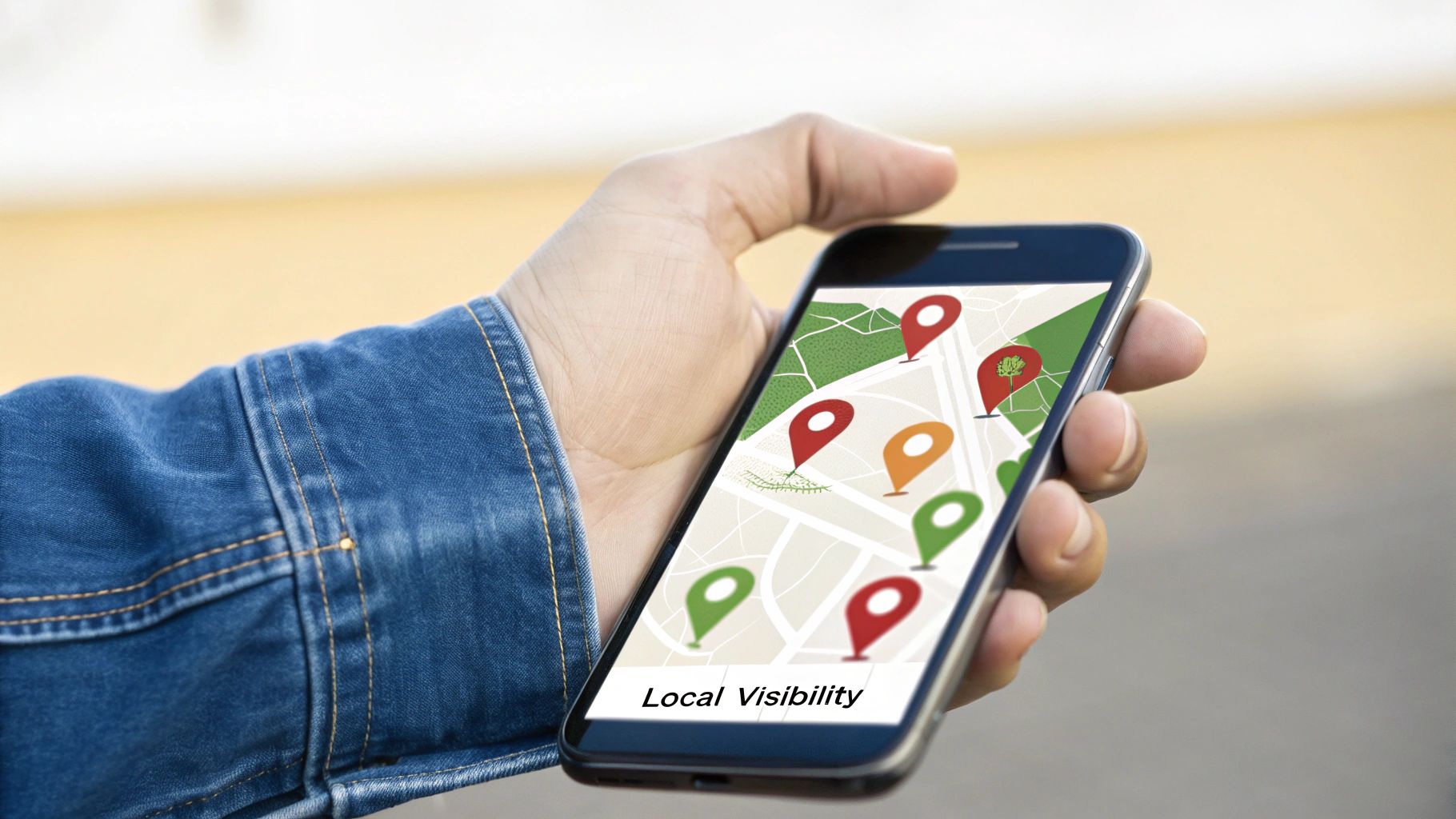
Before a single lead can come through your door, your business has to be visible where your Dubai audience is actually looking. A solid digital footprint isn’t just about having a website; it’s about crafting an online presence that’s finely tuned for the local market. This means getting specific and focusing on signals that truly resonate within the UAE.
Your starting point, and arguably your most vital tool, is your Google Business Profile (GBP). In a city where everyone—from consumers to B2B decision-makers—leans heavily on local search, an incomplete profile is a massive missed opportunity. Make sure every single section is filled out, from your exact map pin to your operating hours and the full list of services you offer.
Tuning In to Local Search Intent
To really get a handle on lead generation in Dubai, you need to think like a local customer. This means digging deep into keyword research to uncover the specific phrases, slang, and even Arabic terms people use when they’re searching for what you sell. Broad, generic keywords are often a waste of money here.
Instead, you’ll want to zero in on long-tail keywords that signal clear local intent. Think about phrases like:
- “Best corporate law firm in DIFC”
- “Luxury villa maintenance Jumeirah”
- “Arabic-speaking financial advisor Dubai”
These queries bring in traffic from people who aren’t just browsing; they’re actively looking for a local business to hire. Every piece of your content, from your main service pages to your blog posts, should be built around these hyper-specific terms. This logic extends to your visual content, too. For instance, a business seeking top-tier e-commerce website design in the UAE will be far more impressed by a portfolio that features successful local brands they recognise.
A powerful local strategy is built on trust. Actively encourage your happy clients to leave reviews on your Google Business Profile. A consistent flow of recent, positive reviews is one of the strongest signals to both Google and potential customers that your business is reputable and trusted within the community.
Creating Content That Genuinely Connects
Your content is where you prove your expertise and build that crucial trust. It’s time to move past generic articles that could have been written for any market in the world. The real goal is to establish your business as the go-to resource for your industry within the GCC.
This means creating content that speaks directly to the unique challenges and opportunities in the region. A few ideas to get you started:
- Local Case Studies: Showcase success stories from your clients right here in Dubai or Abu Dhabi. Get into the details of the specific market challenges they faced and how your solution made a difference.
- GCC Industry Reports: Publish your own analysis on trends impacting the local market. This immediately positions you as a thought leader who understands the nuances of doing business here.
- Bilingual Content: Offering key pages and articles in both English and Arabic is a game-changer. It’s a simple step that can dramatically expand your reach and shows a deep respect for the local culture.
Pulling this off consistently is demanding, which explains why so many businesses turn to specialised agencies. These firms handle everything from performance marketing to high-impact PR, with campaigns costing anywhere from AED 10,000 to AED 50,000 or more—a figure that reflects the immense value of sharp, targeted brand positioning. By building a digital presence that feels authentically local, you’ll start attracting organic traffic that is far more likely to turn into the high-quality leads you’re looking for.
Mastering Paid Advertising in a Competitive Market
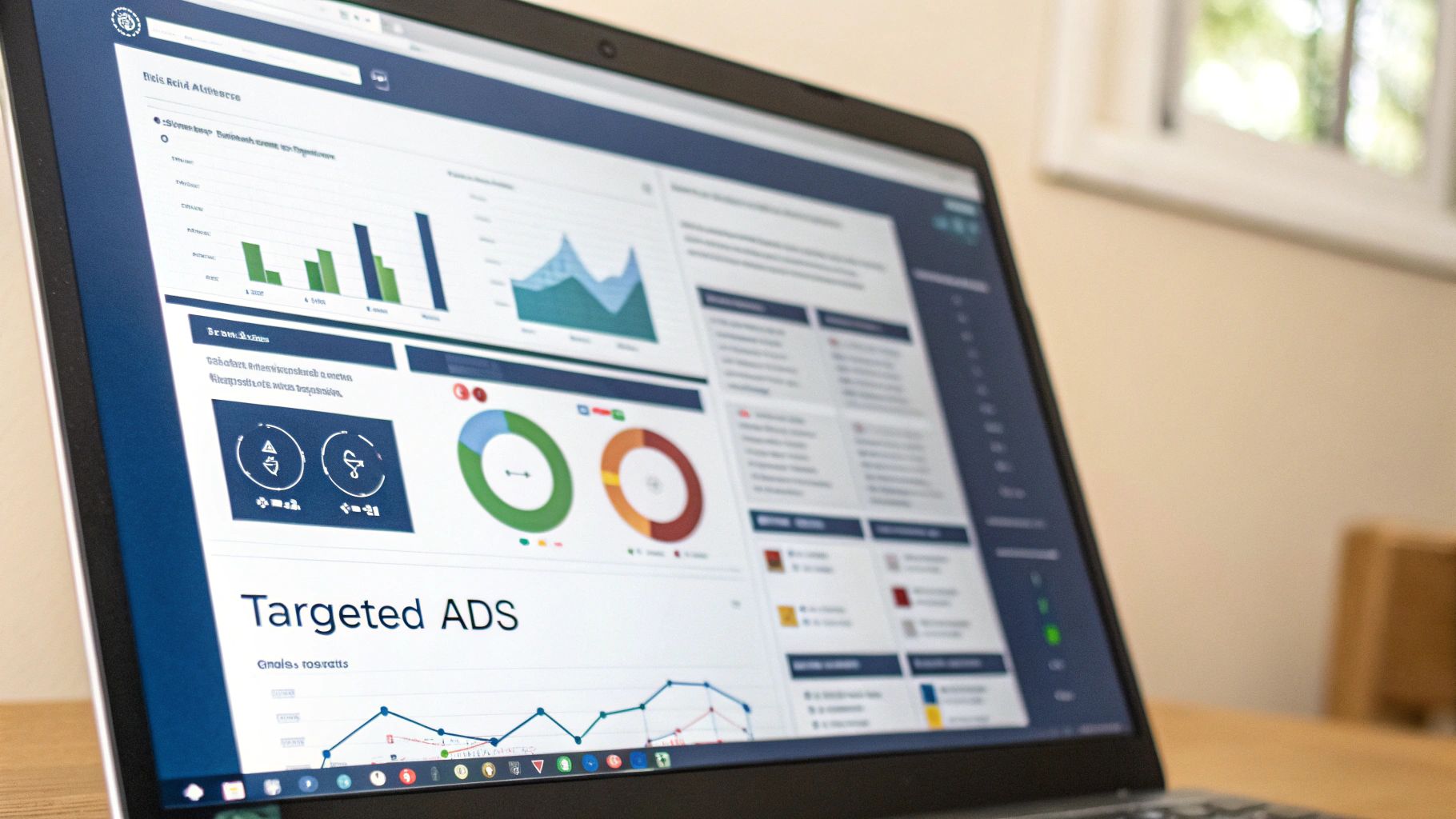
Paid advertising is a powerful engine for growth in Dubai, but let’s be honest—it can turn into a costly experiment very quickly without a sharp strategy. To really succeed, you have to move beyond just boosting posts. The real game is in building finely tuned campaigns across the platforms where your ideal clients actually spend their time.
This is true whether you’re targeting B2B decision-makers on LinkedIn or high-net-worth consumers scrolling through Instagram.
Success with lead generation in Dubai through paid channels is all about precision. Generic, worldwide campaigns just don’t cut it here. The city’s unique demographic mix demands a much more granular approach.
Think about it:
- On LinkedIn, you can target by specific job titles, company sizes within JAFZA, or even seniority levels in the finance sector at DIFC.
- On Instagram or Google Ads, it’s about layering interests with hyper-local targeting to reach residents in specific communities, like Dubai Marina or Arabian Ranches.
Crafting Ads That Cut Through the Noise
Your ad copy and visuals are your first handshake. They absolutely must resonate on a cultural level to stop the scroll.
My advice? Ditch the generic stock imagery that feels out of place. Instead, use visuals that reflect the aspirational, high-quality lifestyle people expect in Dubai. The language needs to be clear and direct, and it’s often smart to incorporate both English and Arabic to broaden your appeal.
For example, an ad for a new software solution shouldn’t just be a list of features. It needs to speak directly to a pain point felt by a regional manager. Maybe show a visual with the Burj Khalifa in the background to create that immediate sense of local relevance. Getting these subtleties right is what separates a mediocre campaign from a great one. If you’re new to this, our guide on what search engine marketing involves is a great place to build some foundational knowledge.
Setting Budgets and Maximising ROI
Budgeting for paid ads in Dubai requires a realistic outlook, especially in competitive sectors like real estate or finance. It’s not a cheap market.
For instance, paid advertising for real estate can see cost-per-click values anywhere between AED 10 and AED 100, heavily influenced by how many competitors are bidding on the same audience. High-demand projects often require premium bids to even get a look-in. Supporting these campaigns with a solid content marketing push can add another AED 5,000 to AED 30,000 to your monthly spend.
To help you get a clearer picture, here’s a breakdown of what you might expect to spend across different channels.
Estimated Monthly Digital Marketing Costs in Dubai by Channel
This table provides estimated monthly budget ranges for key lead generation channels in Dubai, helping businesses plan their marketing spend.
| Channel | Estimated Monthly Cost (AED) | Best For |
|---|---|---|
| Google Ads (Search) | 10,000 – 50,000+ | Capturing high-intent leads actively searching for your solution. |
| Social Media Ads | 7,500 – 35,000 | Building brand awareness and reaching niche audiences. |
| LinkedIn Ads | 15,000 – 60,000 | High-value B2B lead generation and professional targeting. |
| Content & SEO | 5,000 – 30,000 | Building long-term authority and attracting organic traffic. |
These are, of course, estimates. Your actual costs will depend entirely on your industry, target audience, and how aggressive your campaign goals are.
The single biggest lever for improving your ROI is your landing page. It must be flawlessly optimised for mobile, load in under three seconds, and have a crystal-clear call-to-action. We’ve seen conversion rates double just by aligning the landing page message perfectly with the ad that brought the user there.
Finally, retargeting isn’t optional—it’s essential. Very few people convert on their first visit. By using pixels to build custom audiences of website visitors or people who watched your video ads, you can run follow-up campaigns that gently remind them of your value. This simple tactic keeps your brand top-of-mind and significantly improves your overall Cost Per Lead, making sure every dirham you spend is working as hard as possible for you.
Using CRM and Automation to Nurture Leads Effectively
Getting a lead is just the starting pistol firing. The real race in Dubai’s competitive market is turning that initial spark of interest into a signed contract. This is where a smart pairing of a Customer Relationship Management (CRM) system and marketing automation becomes your most powerful tool.
Without a solid system in place, leads inevitably fall through the cracks. Think of a well-set-up CRM as the brain of your sales operation. It remembers everything—from the first ad they clicked to the last email they opened. This means when your sales team picks up the phone, they have the full story and can have a genuinely meaningful conversation, not a cold one.
Choosing the Right Technology Stack
Your first big decision is picking the right platform. You need something that gets the unique rhythm of the Dubai sales cycle, which often involves a lot of back-and-forth across different channels. It’s no surprise that platforms like HubSpot are so popular here; they bring marketing, sales, and customer service together under one roof.
When you’re weighing your options, here are the non-negotiables to look for:
- Multi-Channel Communication: Can it handle emails, SMS, and—crucially for this market—WhatsApp Business?
- Lead Scoring Capabilities: You need a system that can automatically tell you who’s hot and who’s not by tracking their engagement and profile data.
- Ease of Integration: How smoothly will it play with the tools you already use, like your website’s contact forms or your accounting software?
Getting the setup right from day one is everything. If you’re looking into what’s possible, it’s worth understanding the details of a professional HubSpot CRM implementation to see how you can build a system that truly works for your specific business goals.
The flow below gives you a bird’s-eye view of how these systems work together to transform a simple enquiry into a sales-ready opportunity.
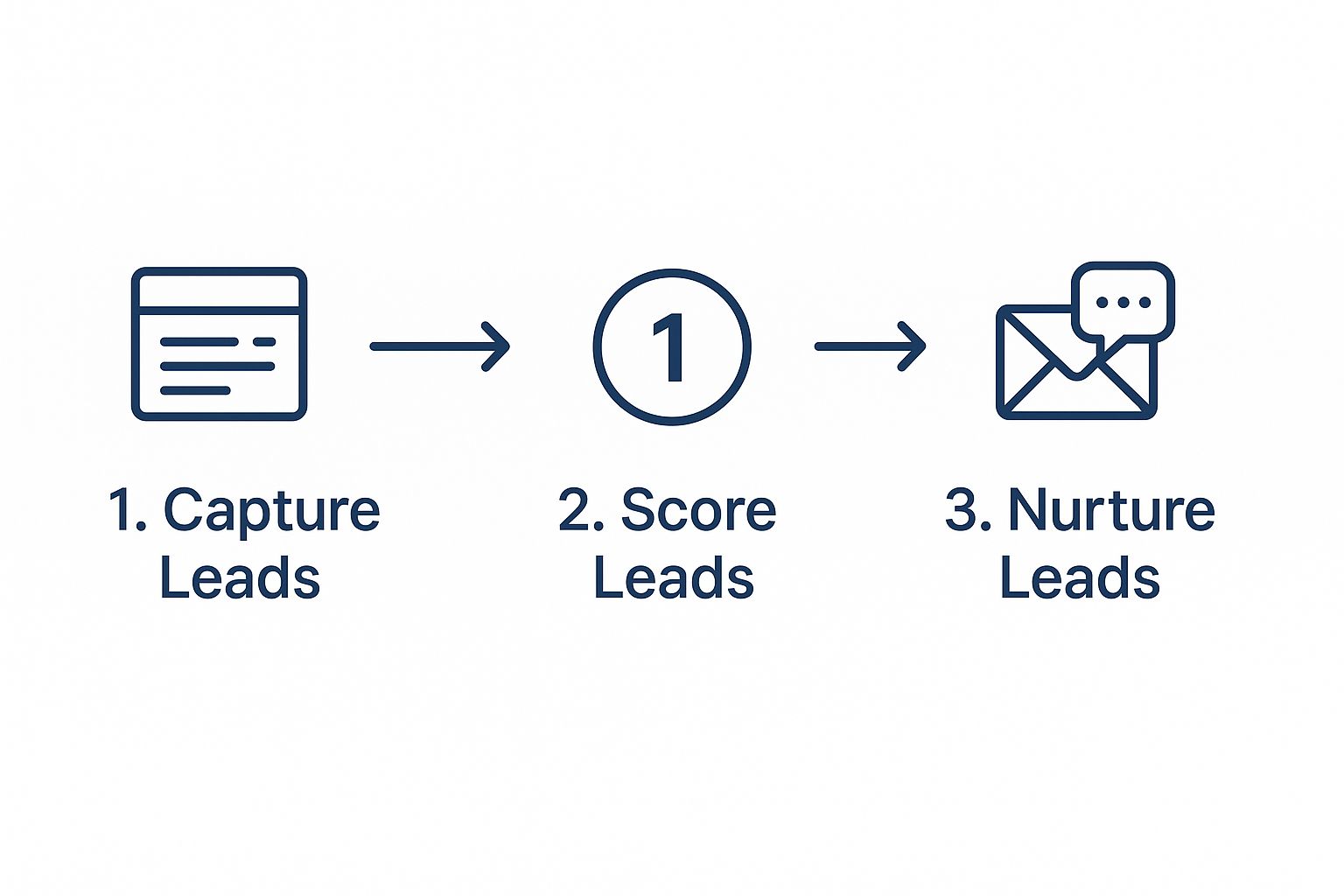
This visual really drives home how automation can methodically capture, qualify, and warm up leads so they’re primed for your sales team.
Automating the Nurturing Process
With your CRM in place, you can start building automated workflows that do the heavy lifting for you. This isn’t about blasting prospects with generic emails. It’s about delivering the perfect message at the perfect time, triggered by their own actions.
Let’s walk through a real-world scenario. A prospect visits your website and downloads a brochure about your services. Instead of just dumping them into your monthly newsletter list, an automated workflow kicks in:
- Immediate Follow-up: An email hits their inbox instantly, thanking them and attaching the brochure.
- Value-Add Content: Two days later, a second email follows up with a relevant case study that shows how you solved a problem for a similar company.
- Sales Notification: If they click through to read that case study, the system flags them as highly interested, bumps up their lead score, and pings a salesperson to make a personal call.
One of the biggest mistakes I see is businesses automating the human element right out of their process. In Dubai, relationships are everything. Use automation to take care of the repetitive, manual tasks so your people can focus their energy on building real connections with your most promising leads.
This kind of layered approach keeps your brand front and centre while gently educating the prospect. You can get even more sophisticated by adding WhatsApp messages for high-value leads or sending SMS reminders for scheduled appointments. By automating these touchpoints, you guarantee no one gets forgotten, which frees up your sales team to do what they do best: close deals.
Measuring Performance to Refine Your Strategy
The best lead generation strategies aren’t something you just “set and forget.” Think of them as living, breathing processes that need to adapt based on what the data is telling you. To really succeed with lead generation in Dubai, you must have a clear way to measure what’s working, double down on your wins, and be ruthless about cutting what isn’t. This goes way beyond just glancing at your website traffic; it’s about digging into the entire journey, from that first click all the way to a signed contract.
Throwing money at campaigns without tracking them is like trying to navigate Downtown Dubai blindfolded. You’d never do it. You need a dashboard—a single source of truth—that brings together data from Google Analytics, your social media ad platforms, and, crucially, your CRM. This setup gives you a bird’s-eye view of your entire funnel, making it painfully obvious where your potential customers are losing interest and dropping off.
Pinpointing Your Key Performance Indicators
It’s easy to get buried in data. To avoid this “analysis paralysis,” focus on a handful of Key Performance Indicators (KPIs) that are directly tied to your revenue. These are the numbers that truly tell the story of your marketing efforts.
Here are the essential metrics you should have your eye on:
- Cost Per Lead (CPL): How many dirhams are you spending to get one single lead? This is your efficiency gauge for every channel you’re using.
- Lead-to-Customer Conversion Rate: What percentage of the leads you bring in actually become paying customers? This is a massive indicator of your lead quality and how effective your sales team is.
- Customer Lifetime Value (CLV): On average, what’s the total revenue you can expect from a customer over their entire relationship with your business? Knowing this number tells you exactly how much you can afford to spend to get a new customer in the door.
Keeping a close watch on these KPIs helps you make much smarter, data-backed decisions. For instance, you might discover that your LinkedIn Ads have a higher CPL than your Instagram campaigns. But if the LinkedIn leads have a far better conversion rate and a higher CLV, it quickly becomes clear that LinkedIn is the more profitable channel for you in the long run.
Diagnosing and Fixing Funnel Bottlenecks
Once your data is flowing in, you can start playing detective. Ask the tough questions. Are your Google Ads getting a ton of clicks but your landing page forms are sitting empty? That’s a classic sign of a mismatch between your ad promise and your page’s content. Or it could be something as simple as a slow-loading page that’s frustrating visitors.
The most common bottleneck we see, time and again, is the handover from marketing to sales. Leads that were once hot go cold simply because the follow-up was too slow or generic. Integrating your CRM with your marketing tools is the fix. It ensures your sales team gets instant alerts on new leads, complete with all the context of what that person has seen and done.
To solve these problems, you have to get comfortable with testing. A/B testing is your best friend. Don’t just test the big, obvious things. Experiment with the small stuff, because it can have a surprisingly big impact. Try a different headline on a landing page, change the colour of your call-to-action button, or tweak the subject line of your follow-up email.
Every test, whether it wins or loses, gives you valuable insight. It’s this constant process of testing and learning that refines your strategy over time, making sure your approach to lead generation gets smarter and more efficient with every dirham you spend.
Your Top Questions About Lead Generation in Dubai, Answered
When you’re trying to generate leads in a market as unique as Dubai, a lot of questions pop up. I get it. Over the years, I’ve seen businesses struggle with the same handful of challenges. Let’s clear up some of the most common ones.
Which Channel Works Best?
Everyone wants to know the “one best channel,” but the honest answer is: it completely depends on who you’re selling to.
If you’re in B2B, targeting professional services or corporate clients, LinkedIn is non-negotiable. It’s where the decision-makers live and breathe online. We’ve seen huge wins for clients who get their LinkedIn strategy right.
But for B2C businesses—think real estate, retail, or hospitality—the game is played on Instagram and Google Ads. The visual appeal of Instagram and the high-intent traffic from Google are a powerful combination. The real secret, though? The smartest companies don’t put all their eggs in one basket. They build a presence across multiple channels where their ideal customers are already spending their time.
How Much Do Cultural Differences Really Matter?
They matter more than you think. In Dubai, trying to force a hard-sell approach right out of the gate is one of the fastest ways to lose a deal. It just doesn’t work here.
Building genuine trust and a solid personal relationship is often the most important part of the sales process. This means your communication needs to be patient, respectful, and feel like it was written for one person, not a thousand.
A key thing to remember is that decision-making in Dubai can often be a group effort and usually takes more time than you might be used to. Pushing for a quick signature will almost certainly backfire. Your entire lead nurturing process needs to be built around this reality, focusing on building rapport first.
Is SEO a Smart Investment Here?
Absolutely, and it’s an area where many competitors are still sleeping. The paid ad space is fierce and expensive, which is precisely why a solid organic strategy is such a powerful long-term asset.
Start with the fundamentals: get your Google Business Profile fully optimised, make a habit of gathering reviews from happy local clients, and create genuinely helpful content in both English and Arabic. It’s a slow burn, but this approach attracts people who are actively looking for what you offer, often at a fraction of the long-term cost of constantly feeding the paid ad machine.
What’s the Real Impact of Technology?
Technology isn’t just a nice-to-have; it’s a massive force multiplier for lead generation in Dubai. The businesses that embrace the right tools are the ones pulling ahead.
For example, we’ve seen firms generate up to three times more leads year-over-year simply by refining their LinkedIn outreach and using AI-powered chatbots to handle initial conversations. These tools automate the top of the funnel, freeing up your sales team to do what they do best: build relationships and close deals.
At Invocom, we don’t just talk about this stuff—we build it. We specialise in creating integrated digital solutions that drive real, measurable growth. Whether it’s a high-performing website, a seamless HubSpot CRM implementation, or strategic Google Ads campaigns, our team has the hands-on expertise to accelerate your lead generation in Dubai. Let’s build your growth engine together. https://invocom.me

